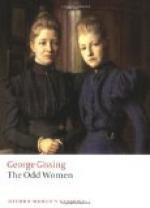Monica gave no verbal reply. She looked towards the door. Bevis stepped forward, and held it open.
’Good-bye, then. You know what I told you about my tendency to low spirits. I’m going to have a terrible turn—down, down, down!’
She laughed, and offered her hand. He held it very lightly, looking at her with his blue eyes, which indeed expressed a profound melancholy.
‘Thank you,’ he murmured. ‘Thank you for your great kindness.’
And thereupon he opened the front door for her. Without another look Monica went quickly down the stairs; she appreciated his motive for not accompanying her to the exit.
* * * * * * * * * *
Before entering the house she had managed to conceal the sheet of music which she was carrying. But, happily, Widdowson was still absent. Half an hour passed—half an hour of brooding and reverie—before she heard his footstep ascending the stairs. On the landing she met him with a pleasant smile.
‘Have you enjoyed your drive?’
‘Pretty well.’
‘And do you feel better?’
‘Not much, dear. But it isn’t worth talking about.’
Later, he inquired where she had been.
‘I had an appointment with Milly Vesper.’
The first falsehood she had ever told him, and yet uttered with such perfect assumption of sincerity as would have deceived the acutest observer. He nodded, discontented as usual, but entertaining no doubt.
And from that moment she hated him. If he had plied her with interrogations, if he had seemed to suspect anything, the burden of untruth would have been more endurable. His simple acceptance of her word was the sternest rebuke she could have received. She despised herself, and hated him for the degradation which resulted from his lordship over her.
CHAPTER XXI
TOWARDS THE DECISIVE
Mary Barfoot had never suffered from lack of interest in life. Many a vivid moment dwelt in her memory; joys and sorrows, personal or of larger scope, affected her the more deeply because of that ruling intelligence which enabled her to transmute them into principles. No longer anticipating or desiring any great change in her own environment, in the modes and motives of her activity, she found it a sufficient happiness to watch, and when possible to direct, the tendency of younger lives. So kindly had nature tempered her disposition, that already she had been able to outlive those fervours of instinct which often make the middle life of an unwedded woman one long repining; but her womanly sympathies remained. And at present there was going forward under her own roof, within her daily observation, a comedy, a drama, which had power to excite all her disinterested emotions. It had been in progress for twelve months, and now, unless she was strangely mistaken, the denouement drew very near.




